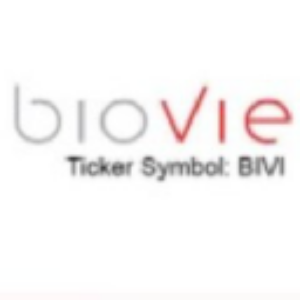BioVie Announces Clinical Data Showing Epigenetic Basis for How Bezisterim May Modulate Inflammation and the Biological Aging Process at the 11th Aging Research and Drug Discovery Meeting
Rhea-AI Summary
BioVie Inc. (NASDAQ: BIVI) presented clinical data on bezisterim at the 11th Aging Research and Drug Discovery Meeting, revealing its potential to modulate inflammation and the biological aging process. Key findings include:
1. Patients treated with bezisterim experienced a 2-4 year age deceleration advantage compared to placebo.
2. Bezisterim modulated DNA methylation of proinflammatory genes and appeared to promote the transition of M1 proinflammatory to M2 anti-inflammatory macrophages.
3. The drug was associated with a 1.5 to 2.3 'fold enrichment' on gene control for hundreds of genes in pathways linked to neurodegenerative disorders and biological processes.
These results suggest bezisterim's potential to impact various age-related diseases and inflammation-related conditions.
Positive
- Bezisterim showed a 2-4 year age deceleration advantage compared to placebo in clinical trials
- The drug demonstrated potential to modulate DNA methylation and impact age-related diseases
- Bezisterim showed 1.5 to 2.3 'fold enrichment' on gene control for pathways associated with neurodegenerative disorders
- Clinical data suggests bezisterim may support the transition of pro-inflammatory M1 macrophages to anti-inflammatory M2 state
Negative
- None.
News Market Reaction
On the day this news was published, BIVI declined 3.00%, reflecting a moderate negative market reaction.
Data tracked by StockTitan Argus on the day of publication.
Bezisterim appears to possess broad homeostatic properties relevant to inflammation and human disorders related to aging
Patients treated with bezisterim experienced 2 to 4 years age deceleration advantage
compared to placebo
Bezisterim modulated DNA methylation of proinflammatory genes and appeared to promote the transition of M1 proinflammatory to M2 anti-inflammatory macrophages
Bezisterim was associated with 1.5 to 2.3 “fold enrichment” on gene control for hundreds of genes in pathways associated with neurodegenerative disorders and biological processes
CARSON CITY, Nev., Aug. 27, 2024 (GLOBE NEWSWIRE) -- BioVie Inc., (NASDAQ: BIVI) (“BioVie” or the “Company”) a clinical-stage company developing innovative drug therapies for the treatment of neurological and neurodegenerative disorders and advanced liver disease, today announced data from an oral presentation at the 11th Aging Research and Drug Discovery Meeting (ARDD 2024) being held August 26-30, 2024 in Copenhagen, Denmark.
The presentation “Bezisterim Effects on Biological Age, Alzheimer’s Epigenetics, and Neurologic Assessments” provided an overview of clinical data to-date on bezisterim, focusing on various analyses and measurements related to longevity and its ability to affect the biological aging process broadly and chronic low-grade inflammation specifically. The presentation was given by Christopher L. Reading, BioVie’s Senior Vice President, Alzheimer’s Disease Program.
“The presented clinical data provides the deepest understanding yet of how bezisterim may work at the gene level to reduce inflammation and impact disease,” said Cuong Do, BioVie’s President and CEO. “The data shows that patients treated with bezisterim experienced a two- to four-year age deceleration advantage when compared to placebo as measured by various biological clocks. The DNA methylation data also explain how bezisterim could modulate the function of specific proinflammatory genes and support the transition of M1 proinflammatory macrophages to the M2 anti-inflammatory state. Most importantly, the data shows bezisterim’s potential ability to control the expression of specific genes in pathways associated with diseases ranging from Parkinson’s and Alzheimer’s to ALS and biological processes ranging from TNF signaling to apoptosis.”
As people age, a natural process called DNA methylation occurs where methyl groups are added to the surface of DNA. The over- or undermethylation of various genes have been shown to be associated with many diseases and the aging process itself. The presentation at ARDD 2024 detailed how bezisterim modulates DNA methylation and may have an impact in the following areas:
- The extent of DNA methylation of a person’s genome can be measured by a series of “clocks” that measure a person’s biological age, and the difference between the biological age and the number of years since birth is known as age deceleration or acceleration. In a clinical trial, patients treated with bezisterim saw an age deceleration advantage compared to those on placebo on various clocks: 3.68 years advantage on SkinBlood Clock (p=0.017), 4.77 years advantage on the Inflammation Age Clock (p=0.022), 5.0 years advantage on the Hannum Age Clock (p=0.006), 1.92 years advantage on the GrimAge Clock (p=0.068), and 3.71 years on the PhenoAge Clock (p=0.081). Bezisterim is believed to be the first drug candidate to show in a clinical trial an impact on modulating DNA methylation and age deceleration in a manner that is associated with specific diseases.
- DNA in blood comes predominantly from 3 cell types: monocytes/macrophages, lymphocytes, and granulocytes, and another set of clocks predicts the level of these immune cells. In the trial, the lymphocyte and granulocyte clocks are strongly and significantly correlated to observed levels of these cells for all patients. Placebo-treated patients saw a similar correlation between the monocyte clock and observed monocyte cell levels while bezisterim-treated patients did not show such correlation. Monocytes/macrophages control innate immunity and inflammation. The observed data suggest that bezisterim may support the transition of macrophages (and microglia in the CNS) from pro-inflammatory M1 state toward the M2 anti-inflammatory M2 state.
- Inflammatory factors, including TNFα, IL6, and MCP1, are produced when molecules such as ERK, MAP3K8, and NFκB perform their roles in various interrelated pathways, and the disruption of their function would disrupt the production of the inflammatory factors. The clinical data presented shows that bezisterim has the potential to significantly modulate the methylation levels of the genes that code for ERK, MAP3K8, NFκB, TNFα, IL6, and others. The data suggest that modulating the methylation levels for the individual actors in the various pathways could lead to reduced production of the inflammatory factors themselves.
- The Kyoto Encyclopedia of Genes and Genomes (KEGG) provides a mapping of known genes, molecules and pathways associated with individual diseases and cellular functions. The clinical data shows that bezisterim is associated with 1.5 to 2.3 “fold enrichment” (genes modulated compared to the pathway genes) in the pathways examined (all p<0.05). This impact was found for pathways leading to Alzheimer’s Disease, Parkinson’s Disease, amyotrophic lateral sclerosis, Huntington’s disease, and the biological processes involving cellular senescence, apoptosis, and TNF signaling.
About DNA Methylation and Bezisterim’s Potential Modulating Role
Everything in the body is encoded for by DNA, which is comprised of a series of four bases: adenine (A), cytosine (C), guanine (G), and thymine (T). As people age, a natural process known as DNA methylation can occur whereby a methyl group is added at various places where a cytosine is adjacent to a guanine (known as a CpG group). Current technology can measure the extent of methylation at roughly 965,000 such CpG sites in our genome, and many of the specific CpG sites can be mapped to genes with known functions. When DNA methylation occurs, the function of that specific gene is impaired because the molecule responsible for decoding that gene may not be able to properly access the genetic information.
Epigenetics is the study of how behavior (e.g., diet, exercise) and environment affect the way our genes work in addition to the genetic code itself, and there’s an increasing body of evidence that signs of aging are epigenetic in nature.1,2 Perhaps the most studied area of epigenetics involves DNA methylation.3 Many studies have shown that genes become over- or under-methylated as we age,4,5,6 thereby suggesting that the modulation of DNA methylation could enable the up- or down-regulation of specific genes and thus modulate the aging process. Several “biological clocks” have been created to determine the biological age of our body based upon DNA methylation levels. A person’s biological age may be different from their actual number of years since birth due to their living habits that may lead to increased or lowered levels of DNA methylation, and the difference between biological age and chronological age is known as age deceleration or acceleration.
Inflammation is a natural phenomenon associated with the body protecting itself. When a stimulus arises that recruits immune cells to help, these cells may release various inflammatory factors (e.g., TNFα, cytokines, chemokines, etc.) as part of their natural function. When the original stimulus has been addressed, immune cells reduce their activity and inflammation correspondingly decreases. When living choices and conditions create a situation where the stimulus is constant, chronic low-grade inflammation can arise since immune cells are constantly at work and are constantly releasing the inflammatory factors. Chronic low-grade inflammation is believed to be the underlying biological driver of many diseases.
Inflammation results from a series of intricate and interrelated pathways involving actors such as ERK, MAP3K8, NFκB, and others that work together to trigger the production of inflammatory agents such as TNFα, IL6, IL17, etc. The genes that code for these pro-inflammatory actors can also be methylated. When these proinflammatory genes are methylated in control regions, their function becomes muted and results in the downward expression of the resulting inflammatory factors.
The clinical data suggest that bezisterim appears to be broadly homeostatic for inflammatory processes and thus has specific up- and down-regulatory roles depending on which CpG and gene it affects (i.e., it does not indiscriminately reduce or increase methylation across the board). The data shows bezisterim modulates methylation for many CpGs as witnessed by the reduction of the biological age across the various clocks. With inflammatory genes, bezisterim upregulates the methylation of genes in the proinflammatory pathways, leading to reduced expression of these genes, which can reduce TNFα and other inflammatory factors.
About Bezisterim
Bezisterim (NE3107) is an orally bioavailable, BBB-permeable, insulin-sensitizer that is also anti-inflammatory. In addition, it is not immunosuppressive and has a low risk of drug-to-drug interaction. Bezisterim has the potential to reduce symptoms of long COVID, including fatigue and cognitive dysfunction. Persistently circulating viral spike proteins are believed to trigger TLR-4 driven activation of NFκB and the subsequent expression of inflammatory cytokines (IL-6, TNF, IFNγ). NE3107 has been shown to modulate the activation of NFκB and thus modulate inflammation.
Bezisterim is being investigated for Alzheimer’s disease (AD) and Parkinson’s disease (PD). BioVie has conducted and reported efficacy data on its Phase 3 randomized, double-blind, placebo-controlled, parallel-group, multicenter study to evaluate bezisterim in patients who have mild-to-moderate AD (NCT04669028). Results of a Phase 2 investigator-initiated trial (NCT05227820) showing bezisterim-treated patients experienced improved cognition and biomarker levels were presented at the Clinical Trials on Alzheimer’s Disease (CTAD) annual conference in December 2022. An estimated six million Americans suffer from AD. A Phase 2 study of bezisterim in PD (NCT05083260) has been completed, and data presented at the AD/PD™ 2023 International Conference on Alzheimer’s and Parkinson’s Diseases and related neurological disorders in Gothenburg, Sweden in March 2023 showed significant improvements in “morning on” symptoms and clinically meaningful improvement in motor control in patients treated with a combination of bezisterim and levodopa vs. patients treated with levodopa alone, and no drug-related adverse events.
About BioVie Inc.
BioVie Inc. (NASDAQ: BIVI) is a clinical-stage company developing innovative drug therapies for the treatment of neurological and neurodegenerative disorders and advanced liver disease. In neurodegenerative disease, the Company’s drug candidate bezisterim inhibits inflammatory activation of ERK and NFkB (e.g., TNF signaling) that leads to neuroinflammation and insulin resistance, but not their homeostatic functions (e.g., insulin signaling and neuron growth and survival). Both are drivers of AD and PD. In liver disease, the Company’s Orphan drug candidate BIV201 (continuous infusion terlipressin), with U.S. Food and Drug Administration (“FDA”) Fast Track status, is being evaluated and discussed with guidance received from the FDA regarding the design of Phase 3 clinical testing of BIV201 for the treatment of ascites due to chronic liver cirrhosis. The active agent is approved in the U.S. and in about 40 countries for related complications of advanced liver cirrhosis. For more information, visit www.bioviepharma.com.
Forward-Looking Statements
This press release contains forward-looking statements, which may be identified by words such as "expect," "look forward to," "anticipate" "intend," "plan," "believe," "seek," "estimate," "will," "project" or words of similar meaning. Although BioVie Inc. believes such forward-looking statements are based on reasonable assumptions, it can give no assurance that its expectations will be attained. Actual results may vary materially from those expressed or implied by the statements herein due to the Company's ability to successfully raise sufficient capital on reasonable terms or at all, available cash on hand and contractual and statutory limitations that could impair our ability to pay future dividends, our ability to complete our pre-clinical or clinical studies and to obtain approval for our product candidates, our ability to successfully defend potential future litigation, changes in local or national economic conditions as well as various additional risks, many of which are now unknown and generally out of the Company's control, and which are detailed from time to time in reports filed by the Company with the SEC, including quarterly reports on Form 10-Q, reports on Form 8-K and annual reports on Form 10-K. BioVie Inc. does not undertake any duty to update any statements contained herein (including any forward-looking statements), except as required by law.
For Investor Relations Inquiries:
Contact:
Bruce Mackle
Managing Director
LifeSci Advisors, LLC
bmackle@lifesciadvisors.com
For Media Inquires
Melyssa Weible
Managing Partner, Elixir Health Public Relations
Ph: +1 201-723-5705
mweible@elixirhealthpr.com
______________________
1 Oberdoerffer P Nat Rev Mol Cell Biol 2007, 8:692–702.
2 Campisi J J Gerontol A Biol Sci Med Sci 2009, 64A:175–178.
3 Moore L Neuropsychopharmacology vol 38, pages23–38 (2013)
4 Fraga MF Ann N Y Acad Sci 2007, 1100:60–74.
5 Christensen BC PLoS Genet 2009, 5:e1000602
6 Horvath S Genome Biol 2012, 13:R97








